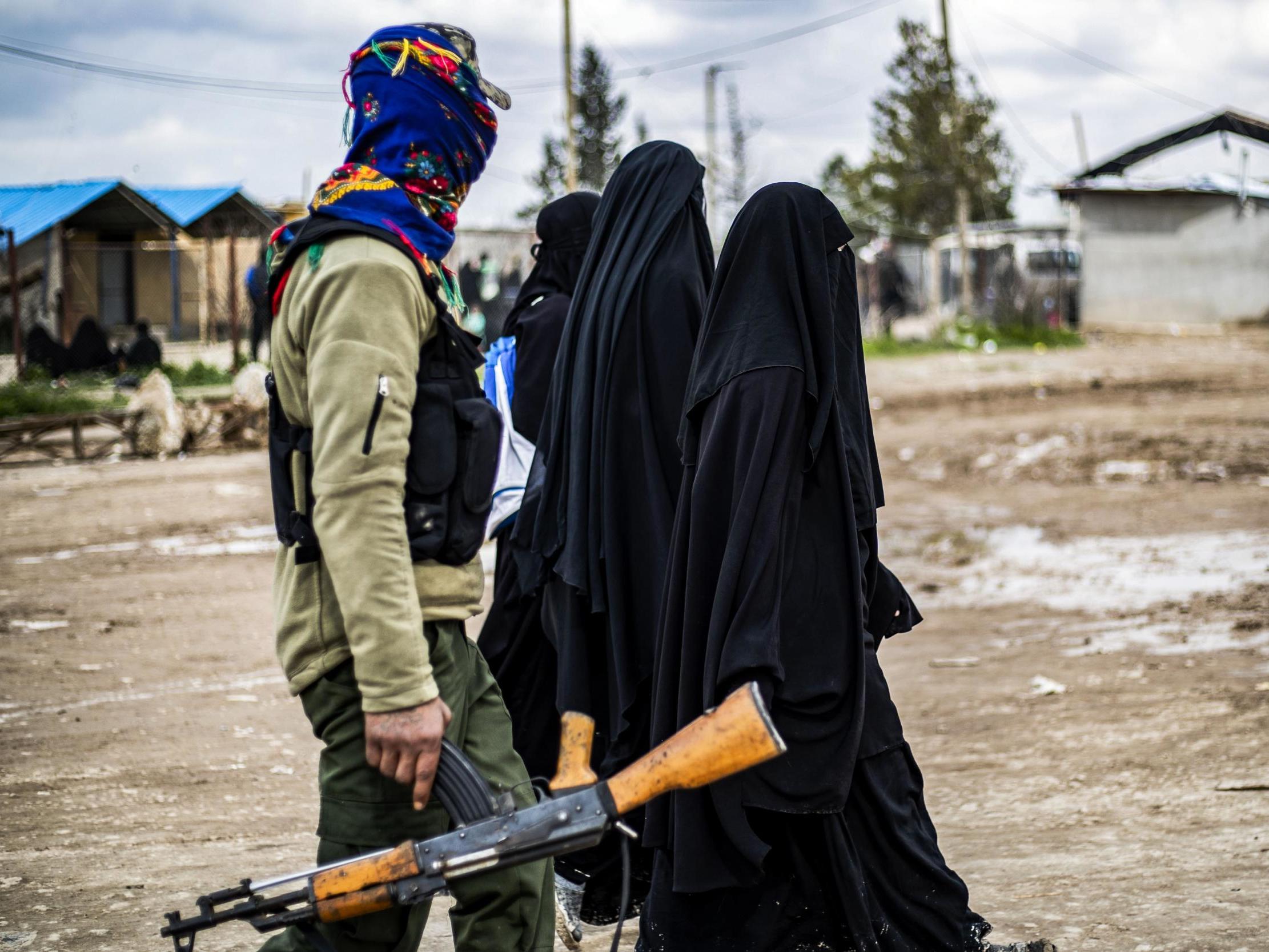Syrian camp for Isis families described as ‘time bomb’ following spate of violence
Authorities have repeatedly raised alarm about extremists operating inside camp

A detention camp holding thousands of Isis families in Syria is becoming increasingly unstable as women who remain loyal to the group have tried to continue its reign of terror after the fall of the “caliphate”.
In the past week alone, a young boy at al-Hol camp in the country’s northeast was reportedly stabbed to death by a group of women Isis members, and a riot broke out which camp guards eventually put down by gunfire.
A small group of hardcore Isis sympathisers in an annexe of the camp reserved for foreign prisoners is thought to be behind the violence. They have reportedly set up their own court and religious police, who have been meting out punishments.
Camp authorities have warned that they may not be able to control the roughly 70,000 inhabitants, most of whom were detained as they fled the last remnants of the Isis caliphate earlier this year.
“This is an Isis city – 70,000 people cannot be controlled. We have only enough guards to protect from outside attack,” said Mustafa Bali, a spokesman for the Syrian Democratic Forces, which controls the camp.
Syria at war: Fleeing the caliphate
Show all 14“The situation is dangerous and only becomes worse. We say over and over that al-Hol is a ticking time bomb and [an] Isis academy. The world watches but does nothing,” he said this week, adding that guns and other weapons had been smuggled into the camp.
The outbreak of violence comes as a group of British MPs calls for the government to take greater responsibility for UK Isis suspects being held in the camp.
A cross-party delegation from both Houses of Parliament, which visited the SDF-controlled territory in northeast Syria last month, said in a statement that holding tens of thousands of prisoners is “beyond the capacity” of local authorities.
Among the representatives were Lloyd Russell-Moyle MP, former Foreign Affairs Select Committee members Crispin Blunt MP, Adam Holloway MP and Lord Maurice Glasman.
“The challenge is substantial and immediate,” they said in a joint statement following a four-day visit. “Failure to prioritise this would be international security negligence of the first order.”
It was unclear exactly what sparked the violence at al-Hol camp this week. In one account, a Kurdish official told AFP that Isis women had killed a woman after sentencing her to death in a “court”.
A gunfight broke out when guards tried to intervene, which left another woman dead. In another incident, Doctors Without Borders said four women were injured by gunfire after guards confronted a protest. Local media later reported that a young man named Abdullah Ahmad was killed by Isis-sympathising women. It was unclear what the motive was.
The outbreak of violence this week is not the first time the alarm has been raised about conditions in the camp.
In an interview with The Independent earlier this year, Major General Alexus Grynkewich, deputy commander of the international anti-Isis coalition, described the potential for radicalisation in the camps as “the biggest long-term strategic risk” in the fight against the jihadi group outside of ongoing military operations.
“The anecdotal stories we have about some of the women with their children who were surrendering, if you will, is that there are hardcore Isis ideologues among them. We certainly have seen reporting from some of the partners who work in those camps that there is a fair amount of that ideology,” he said.
Al-Hol is the largest of a number of camps housing the families of Isis fighters. It has a population just shy of 70,000 people – mostly women and children from Syria and Iraq, together with about 9,000 foreign citizens.
Nearly half of its inhabitants are children under the age of 12. They will have been subjected to years of indoctrination under Isis, which may be continuing to this day.
Journalists and humanitarian workers who have visited the camp have reported seeing women shouting Isis slogans, and there have been a number of attacks by alleged Isis sympathisers against other residents for not adhering to the group’s strict religious rules. In July, a female foreign Isis detainee reportedly stabbed a Kurdish guard in the back, sparking an evacuation of NGO workers.
The international community has struggled to find an answer to the question of what to do with the thousands of residents of al-Hol, and a number of smaller camps in the country.
Foreign governments have shown little willingness to take back their citizens from the camps over fears they will pose a significant security risk. There are thought to be at least 19 British women currently at al-Hol, and camps Roj and Ain Issa, together with at least 30 of their children. Shamima Begum was moved to Roj from al-Hol, and the British government has removed her citizenship and said she will not be allowed to return home.
Subscribe to Independent Premium to bookmark this article
Want to bookmark your favourite articles and stories to read or reference later? Start your Independent Premium subscription today.

Join our commenting forum
Join thought-provoking conversations, follow other Independent readers and see their replies